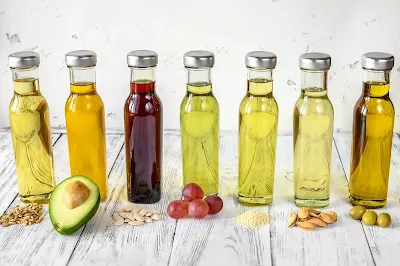When it comes to your nutrition, not all fats are created equal. There are healthy fats and harmful fats. It's critical to consume more beneficial fats like monounsaturated fats while avoiding the harmful fats that put you at risk for health problems.
Fat's roles in the Body:
- Make provision for long-term energy storage
- Give you energy while keeping you full
- Aid in the absorption of vitamins A, E, D, and K
- Assist in maintaining your body's temperature
- Supports Several cell functions
Recommended Healthy Fats:
Omega-3 Fatty acids
These are necessary fats, which the body cannot produce on its own and must obtain from diet. Fish, vegetable oils, nuts (particularly walnuts), flax seeds, flaxseed oil, and green vegetables are abundant in Omega-3.
These fatty acids are an essential component of cell membranes throughout the body, where they influence the function of cell receptors. They serve as a starting point for the production of hormones that govern blood clotting, arterial wall contraction and relaxation, and inflammation. They also attach to cell receptors that influence genetic activity. Omega-3 fats have been proven to slow the advancement of kidney disease and assist prevent heart disease.
Omega 3 has also been proven very beneficial for diabetics: Recommended article
Food oils containing Omega 3:
- Flaxseed oil
- Canola oil
- Soybean oil
- Fish oil
Polyunsaturated fats
Your risk of heart disease and stroke can be decreased by consuming more polyunsaturated fats, which can also help lower blood levels of harmful cholesterol. Also, they give your body's cells the nourishment they need to grow and remain healthy. Polyunsaturated fat-rich oils also provide the diet with vitamin E, an antioxidant that most Americans lack enough of.
Oils high in polyunsaturated fats also supply omega-6 and omega-3 fatty acids, which your body needs but cannot make on its own.
While all fats provide 9 calories per gram, monounsaturated and polyunsaturated fats, when consumed in moderation, can improve your health. Your health may be harmed by trans fats and saturated fats, which are considered to be harmful fats.
Food oil containing Polyunsaturated oils:
- Corn oil
- Soybean oil
- Safflower oil
- Walnuts
- Sunflower seeds
- Flax seeds or flax oil
Monounsaturated Fats
Plant foods rich in monounsaturated fats include almonds, avocados, and vegetable oils. Consuming reasonable amounts of monounsaturated (and polyunsaturated) fats instead of saturated and trans fats can improve your health.
Monounsaturated fats are beneficial to your health in various ways:
- They reduce your bad cholesterol, often known as LDL cholesterol.
- They also assist to boost your HDL (good cholesterol) levels.
Cholesterol is a soft, waxy material that can create clogged or blocked arteries (blood vessels). Keeping your LDL level low lowers your risk of heart disease and stroke.
Monounsaturated fats aid in cell development and maintenance.
Food oils containing monounsaturated fats:
- Peanut oil
- Safflower oil
- Sesame oil
- Olive oil
- Canola oil
- Avocado oil
- Canola oil




0 Comments
Post a Comment
Share your views